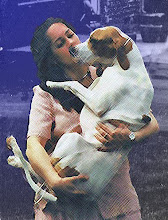 Pointers are a relatively healthy breed. The average lifespan is 12 years, and 13, 14, 15, and even 16 and older are quite common. We don't really believe in referring to our dogs as elderly until they have reached 12...
Pointers are a relatively healthy breed. The average lifespan is 12 years, and 13, 14, 15, and even 16 and older are quite common. We don't really believe in referring to our dogs as elderly until they have reached 12... some of which can be treated with medication and dietary changes. Reduced kidney function can sometimes be helped by a change of diet or with medication. Reduced liver function can be treated holistically with herbal supplements. (Morgan had been losing weight and having intermittent diahrrea. Bloodwork showed some loss of liver enzyme function. At our vet's suggestion, we began supplementing her with some holistic vitamins, and she's gained 7 lbs and begun having normal stools again. She is more alert and more active even than she was 2 years ago!) Heart problems often can be treated with medication.
some of which can be treated with medication and dietary changes. Reduced kidney function can sometimes be helped by a change of diet or with medication. Reduced liver function can be treated holistically with herbal supplements. (Morgan had been losing weight and having intermittent diahrrea. Bloodwork showed some loss of liver enzyme function. At our vet's suggestion, we began supplementing her with some holistic vitamins, and she's gained 7 lbs and begun having normal stools again. She is more alert and more active even than she was 2 years ago!) Heart problems often can be treated with medication. 9)Many older dogs suffer from aches, pains, and arthritis. There are quite a few pain medications, steroids and anti-inflammatory drugs, as well as various dietary supplements like glucosamine and chondroitin that can help with these kinds of issues. Kelson has suffered quite a bit of spinal degeneration. He can no longer do stairs and has a very awkward gait when he moves. He can still come running for his dinner, tho! He has had to learn not to try and go upstairs, not to try and be first out the door, and to be careful on our kitchen floor. He has to be helped into the car.
10) Older dogs often have little patience with puppies or adolescents. Kelson was our puppy nanny for years. Now that he has gotten a bit infirm, he no longer enjoys puppies (he runs!) and cannot defend himself in games against he younger boys. He doesn't get put out with the younger dogs to play anymore. The younger dogs have all been taught not to bully him and Duncan is my new puppy nanny.
We also believe in a variety of alternative treatments in addition to regular veterinary care. Many of our dogs have been seen by a veterinary chiropractor which has been very beneficial. We've also heard good things from other folks who've used holistic vets and acupunture. In conjunction with regular veterinary treatment, all these things can be helpful in maintaining the quality of life for your older pointers.
Some suggestions for living with older pointers:
1) Get routine bloodwork done
2) Work with your vet regarding dietary needs and pain control for dogs who need it
3) Keep an eye out for sudden weight loss - this usually means a trip to the vet is in order
4) Keep an eye out for sudden appetite changes or behavior changes - a vet visit might be needed
5) Have any suspicious lumps, bumps or warts checked by your vet
6) Be aware of changes in urination and stools. Often these signal a health concern that might be treatable.
6) Keep an eye out with the younger dogs - they are often impolite and too exhuberant with our older dogs
7) Older dogs might enjoy a more indoor life in extreme temperatures. An extra blanket, a heating pad set on low or a warm supper might be welcome in winter. Air conditioning, fresh ice water or a particularly shady corner outdoors will be appreciated in hot weather.
8) Older dogs might enjoy more luxurious bedding. Some extra padding can be nice when they age and begin to feel those aches and pains. If you are having issues with intermittent incontience, we suggest removing the stuffing from your dogbeds and wrapping the stuffing in a trashbag. Replace the stuffing and then, if an accident occurs, you can simply wash the outer covering and replace the trash bag without having to wash the entire bed.
9) Keeping your older dog's teeth clean can be an important factor in his overall health. Bad teeth can lead to infections, lack of appetite and overall poor health. Keeping an eye on tartar and possibly having a veterinary teeth cleaning is a good idea.
10) Don't assume that just because the dog is aging that his ailments cannot be treated. Many times improvements can be made in the quality of your dog's life. Work with your vet to make the most of your pointer's "golden years."
Despite these suggestions, there does come a time when nothing more can be done to improve the life of our elderly companions. One of the hardest decisions to make is when to allow our pets to go. It is a gift we can give to them - to take their pain and make it ours, instead. No one wants to have to make such a choice, but sometimes it is best to help them on their way when their quality of life is no longer acceptable. Only your family can know what is best for your dog. We know the difficulty of making these decisions, and hope this article gi ves you some hope that if you've done all that you can, that final decision is the right one when the time comes.
ves you some hope that if you've done all that you can, that final decision is the right one when the time comes.
Some of the best things about having older dogs is how easy they can be. They know the rules. They are rarely destructive. They make super companions and seem to know not to get in the way. They keep the younger dogs in line. Best of all, they have spent their life devoted to being our friend. They are never here long enough!











No comments:
Post a Comment